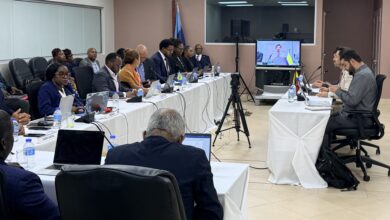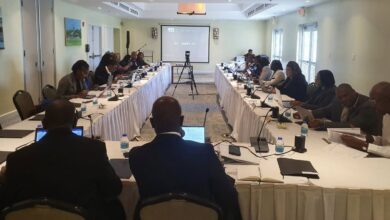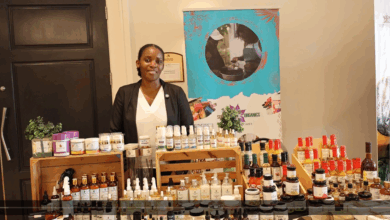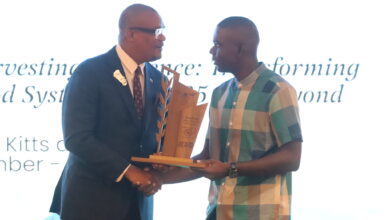(CARICOM Secretariat, Turkeyen, Greater Georgetown, Guyana) Trade Ministers of the Caribbean Community, meeting at the Twenty-Sixth Special Meeting for the Council of Trade and Economic Development in Antigua and Barbuda on 10 May 2008, examined various issues relating to the Region’s banana industry, in particular, matters affecting the level of preferential access to the European market — preferences that have been instrumental in raising thousands of small farmers out of poverty while enabling them to achieve commendable levels of social and environmental responsibility.
Ministers noted with appreciation the Joint Statement emanating from a meeting of Ministers of Agriculture and representatives of Cameroon, Cyprus, the Dominican Republic, France, Ghana, Greece, Cote d’Ivoire, Jamaica, Madagascar, Portugal, Spain and Suriname held in Paris on 30 April 2008, which upheld the importance of maintaining a stable banana market in the European Union (EU), catering in a balanced way to the interests of all those who participate in it.
Ministers noted with satisfaction that the recently initialled Economic Partnership Agreement (EPA) will shield the Region’s preferential access to the EU market from further legal challenge in the WTO. On the other hand, Ministers expressed their grave concern about the possible reduction in the EU’s Most Favoured Nation (MFN) tariff on bananas, which provides the necessary preferential margin that enables the Region to continue exporting profitably to the European market. It was observed that the group of MFN suppliers – who were granted quota-free access to the EU market in January 2006 and whose exports have since increased by 20 percent – have continued to call for substantial reductions in the EU’s tariff, the predominant effect of which would be to severely hamper the ability of Caribbean producers to compete in the EU market. It was noted that, once again, the Caribbean had found itself excluded from discussions between the EU and the MFN suppliers, the results of which could be devastating for its economic interests. Ministers also observed that, in the WTO Doha negotiations, the same group of countries, claiming to be interested in the liberalisation of “tropical products”, has as its main objective the elimination of the small share of the EU market available to banana producers in the African, Caribbean and Pacific (ACP) countries.
Ministers reaffirmed that, if the outcome of the WTO Doha Development Agenda negotiations are to be balanced, there must be suitable treatment for products that are the subject of longstanding preferences and that if this were not to be the case, Caribbean countries would find it easier to join in any consensus.(CARICOM Secretariat, Turkeyen, Greater Georgetown, Guyana) Trade Ministers of the Caribbean Community, meeting at the Twenty-Sixth Special Meeting for the Council of Trade and Economic Development in Antigua and Barbuda on 10 May 2008, examined various issues relating to the Region’s banana industry, in particular, matters affecting the level of preferential access to the European market — preferences that have been instrumental in raising thousands of small farmers out of poverty while enabling them to achieve commendable levels of social and environmental responsibility.
Ministers noted with appreciation the Joint Statement emanating from a meeting of Ministers of Agriculture and representatives of Cameroon, Cyprus, the Dominican Republic, France, Ghana, Greece, Cote d’Ivoire, Jamaica, Madagascar, Portugal, Spain and Suriname held in Paris on 30 April 2008, which upheld the importance of maintaining a stable banana market in the European Union (EU), catering in a balanced way to the interests of all those who participate in it.
Ministers noted with satisfaction that the recently initialled Economic Partnership Agreement (EPA) will shield the Region’s preferential access to the EU market from further legal challenge in the WTO. On the other hand, Ministers expressed their grave concern about the possible reduction in the EU’s Most Favoured Nation (MFN) tariff on bananas, which provides the necessary preferential margin that enables the Region to continue exporting profitably to the European market. It was observed that the group of MFN suppliers – who were granted quota-free access to the EU market in January 2006 and whose exports have since increased by 20 percent – have continued to call for substantial reductions in the EU’s tariff, the predominant effect of which would be to severely hamper the ability of Caribbean producers to compete in the EU market. It was noted that, once again, the Caribbean had found itself excluded from discussions between the EU and the MFN suppliers, the results of which could be devastating for its economic interests. Ministers also observed that, in the WTO Doha negotiations, the same group of countries, claiming to be interested in the liberalisation of “tropical products”, has as its main objective the elimination of the small share of the EU market available to banana producers in the African, Caribbean and Pacific (ACP) countries.
Ministers reaffirmed that, if the outcome of the WTO Doha Development Agenda negotiations are to be balanced, there must be suitable treatment for products that are the subject of longstanding preferences and that if this were not to be the case, Caribbean countries would find it easier to join in any consensus.(CARICOM Secretariat, Turkeyen, Greater Georgetown, Guyana) Trade Ministers of the Caribbean Community, meeting at the Twenty-Sixth Special Meeting for the Council of Trade and Economic Development in Antigua and Barbuda on 10 May 2008, examined various issues relating to the Region’s banana industry, in particular, matters affecting the level of preferential access to the European market — preferences that have been instrumental in raising thousands of small farmers out of poverty while enabling them to achieve commendable levels of social and environmental responsibility.
Ministers noted with appreciation the Joint Statement emanating from a meeting of Ministers of Agriculture and representatives of Cameroon, Cyprus, the Dominican Republic, France, Ghana, Greece, Cote d’Ivoire, Jamaica, Madagascar, Portugal, Spain and Suriname held in Paris on 30 April 2008, which upheld the importance of maintaining a stable banana market in the European Union (EU), catering in a balanced way to the interests of all those who participate in it.
Ministers noted with satisfaction that the recently initialled Economic Partnership Agreement (EPA) will shield the Region’s preferential access to the EU market from further legal challenge in the WTO. On the other hand, Ministers expressed their grave concern about the possible reduction in the EU’s Most Favoured Nation (MFN) tariff on bananas, which provides the necessary preferential margin that enables the Region to continue exporting profitably to the European market. It was observed that the group of MFN suppliers – who were granted quota-free access to the EU market in January 2006 and whose exports have since increased by 20 percent – have continued to call for substantial reductions in the EU’s tariff, the predominant effect of which would be to severely hamper the ability of Caribbean producers to compete in the EU market. It was noted that, once again, the Caribbean had found itself excluded from discussions between the EU and the MFN suppliers, the results of which could be devastating for its economic interests. Ministers also observed that, in the WTO Doha negotiations, the same group of countries, claiming to be interested in the liberalisation of “tropical products”, has as its main objective the elimination of the small share of the EU market available to banana producers in the African, Caribbean and Pacific (ACP) countries.
Ministers reaffirmed that, if the outcome of the WTO Doha Development Agenda negotiations are to be balanced, there must be suitable treatment for products that are the subject of longstanding preferences and that if this were not to be the case, Caribbean countries would find it easier to join in any consensus.(CARICOM Secretariat, Turkeyen, Greater Georgetown, Guyana) Trade Ministers of the Caribbean Community, meeting at the Twenty-Sixth Special Meeting for the Council of Trade and Economic Development in Antigua and Barbuda on 10 May 2008, examined various issues relating to the Region’s banana industry, in particular, matters affecting the level of preferential access to the European market — preferences that have been instrumental in raising thousands of small farmers out of poverty while enabling them to achieve commendable levels of social and environmental responsibility.
Ministers noted with appreciation the Joint Statement emanating from a meeting of Ministers of Agriculture and representatives of Cameroon, Cyprus, the Dominican Republic, France, Ghana, Greece, Cote d’Ivoire, Jamaica, Madagascar, Portugal, Spain and Suriname held in Paris on 30 April 2008, which upheld the importance of maintaining a stable banana market in the European Union (EU), catering in a balanced way to the interests of all those who participate in it.
Ministers noted with satisfaction that the recently initialled Economic Partnership Agreement (EPA) will shield the Region’s preferential access to the EU market from further legal challenge in the WTO. On the other hand, Ministers expressed their grave concern about the possible reduction in the EU’s Most Favoured Nation (MFN) tariff on bananas, which provides the necessary preferential margin that enables the Region to continue exporting profitably to the European market. It was observed that the group of MFN suppliers – who were granted quota-free access to the EU market in January 2006 and whose exports have since increased by 20 percent – have continued to call for substantial reductions in the EU’s tariff, the predominant effect of which would be to severely hamper the ability of Caribbean producers to compete in the EU market. It was noted that, once again, the Caribbean had found itself excluded from discussions between the EU and the MFN suppliers, the results of which could be devastating for its economic interests. Ministers also observed that, in the WTO Doha negotiations, the same group of countries, claiming to be interested in the liberalisation of “tropical products”, has as its main objective the elimination of the small share of the EU market available to banana producers in the African, Caribbean and Pacific (ACP) countries.
Ministers reaffirmed that, if the outcome of the WTO Doha Development Agenda negotiations are to be balanced, there must be suitable treatment for products that are the subject of longstanding preferences and that if this were not to be the case, Caribbean countries would find it easier to join in any consensus.(CARICOM Secretariat, Turkeyen, Greater Georgetown, Guyana) Trade Ministers of the Caribbean Community, meeting at the Twenty-Sixth Special Meeting for the Council of Trade and Economic Development in Antigua and Barbuda on 10 May 2008, examined various issues relating to the Region’s banana industry, in particular, matters affecting the level of preferential access to the European market — preferences that have been instrumental in raising thousands of small farmers out of poverty while enabling them to achieve commendable levels of social and environmental responsibility.
Ministers noted with appreciation the Joint Statement emanating from a meeting of Ministers of Agriculture and representatives of Cameroon, Cyprus, the Dominican Republic, France, Ghana, Greece, Cote d’Ivoire, Jamaica, Madagascar, Portugal, Spain and Suriname held in Paris on 30 April 2008, which upheld the importance of maintaining a stable banana market in the European Union (EU), catering in a balanced way to the interests of all those who participate in it.
Ministers noted with satisfaction that the recently initialled Economic Partnership Agreement (EPA) will shield the Region’s preferential access to the EU market from further legal challenge in the WTO. On the other hand, Ministers expressed their grave concern about the possible reduction in the EU’s Most Favoured Nation (MFN) tariff on bananas, which provides the necessary preferential margin that enables the Region to continue exporting profitably to the European market. It was observed that the group of MFN suppliers – who were granted quota-free access to the EU market in January 2006 and whose exports have since increased by 20 percent – have continued to call for substantial reductions in the EU’s tariff, the predominant effect of which would be to severely hamper the ability of Caribbean producers to compete in the EU market. It was noted that, once again, the Caribbean had found itself excluded from discussions between the EU and the MFN suppliers, the results of which could be devastating for its economic interests. Ministers also observed that, in the WTO Doha negotiations, the same group of countries, claiming to be interested in the liberalisation of “tropical products”, has as its main objective the elimination of the small share of the EU market available to banana producers in the African, Caribbean and Pacific (ACP) countries.
Ministers reaffirmed that, if the outcome of the WTO Doha Development Agenda negotiations are to be balanced, there must be suitable treatment for products that are the subject of longstanding preferences and that if this were not to be the case, Caribbean countries would find it easier to join in any consensus.
Ministers noted with appreciation the Joint Statement emanating from a meeting of Ministers of Agriculture and representatives of Cameroon, Cyprus, the Dominican Republic, France, Ghana, Greece, Cote d’Ivoire, Jamaica, Madagascar, Portugal, Spain and Suriname held in Paris on 30 April 2008, which upheld the importance of maintaining a stable banana market in the European Union (EU), catering in a balanced way to the interests of all those who participate in it.
Ministers noted with satisfaction that the recently initialled Economic Partnership Agreement (EPA) will shield the Region’s preferential access to the EU market from further legal challenge in the WTO. On the other hand, Ministers expressed their grave concern about the possible reduction in the EU’s Most Favoured Nation (MFN) tariff on bananas, which provides the necessary preferential margin that enables the Region to continue exporting profitably to the European market. It was observed that the group of MFN suppliers – who were granted quota-free access to the EU market in January 2006 and whose exports have since increased by 20 percent – have continued to call for substantial reductions in the EU’s tariff, the predominant effect of which would be to severely hamper the ability of Caribbean producers to compete in the EU market. It was noted that, once again, the Caribbean had found itself excluded from discussions between the EU and the MFN suppliers, the results of which could be devastating for its economic interests. Ministers also observed that, in the WTO Doha negotiations, the same group of countries, claiming to be interested in the liberalisation of “tropical products”, has as its main objective the elimination of the small share of the EU market available to banana producers in the African, Caribbean and Pacific (ACP) countries.
Ministers reaffirmed that, if the outcome of the WTO Doha Development Agenda negotiations are to be balanced, there must be suitable treatment for products that are the subject of longstanding preferences and that if this were not to be the case, Caribbean countries would find it easier to join in any consensus.





